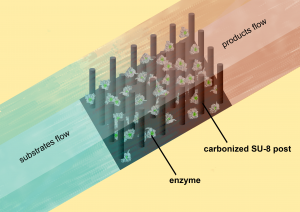Funding source: Polish National Science Centre (NCN)
Project number: NCN 2014/15/B/ST4/04646
PI: Martin Jönsson-Niedziółka
Total funding: 394 261 PLN
Short description:
 A key point of the project is the development of three-dimensional electrodes for use in microfluidic channels. These both increase the surface area, for more enzyme immobilisation, and better utilise the flow of substrate than traditional microband electrodes, by not allowing the majority of the liquid to pass above the electrode. Through photolithography and pyrolysis of SU-8 we can create ordered 3D structures that make it possible to simulate the hydrodynamic flow around the electrodes using e.g. the software COMSOL. The electrode will be further functionalised, in or ex situ, to provide a suitable surface for enzyme electrochemistry.
A key point of the project is the development of three-dimensional electrodes for use in microfluidic channels. These both increase the surface area, for more enzyme immobilisation, and better utilise the flow of substrate than traditional microband electrodes, by not allowing the majority of the liquid to pass above the electrode. Through photolithography and pyrolysis of SU-8 we can create ordered 3D structures that make it possible to simulate the hydrodynamic flow around the electrodes using e.g. the software COMSOL. The electrode will be further functionalised, in or ex situ, to provide a suitable surface for enzyme electrochemistry.
Posts tagged with Opus-8.
Publications:
E. Witkowska Nery, M. Kundys-Siedlecka, Y. Furuya, M. Jönsson-Niedziółka
Pencil Lead as a Material for Microfluidic 3D-Electrode Assemblies, Sensors 18(11), 4037 (2018). (link – OA)(blog)
W. Adamiak, D Kaluza, M Jönsson-Niedziolka
Compatibility of organic solvents for electrochemical measurements in PDMS-based microfluidic devices, Microfluid. Nanofluid. 20, 127 (2016). (link)(blog)
M. Kundys, W. Adamiak, M. Jönsson-Niedziółka
Rotating droplet as a new alternative for small volume electrochemical measurements, Electrochem. Commun. 72, 46-49 (2016). (link)(blog)
E. Witkowska Nery, M. Kundys, P. S. Jeleń, M. Jönsson-Niedziółka
Electrochemical glucose sensing – is there still room for improvement?, Anal. Chem. 88, 11271–11282 (2016). (link) (blog)
